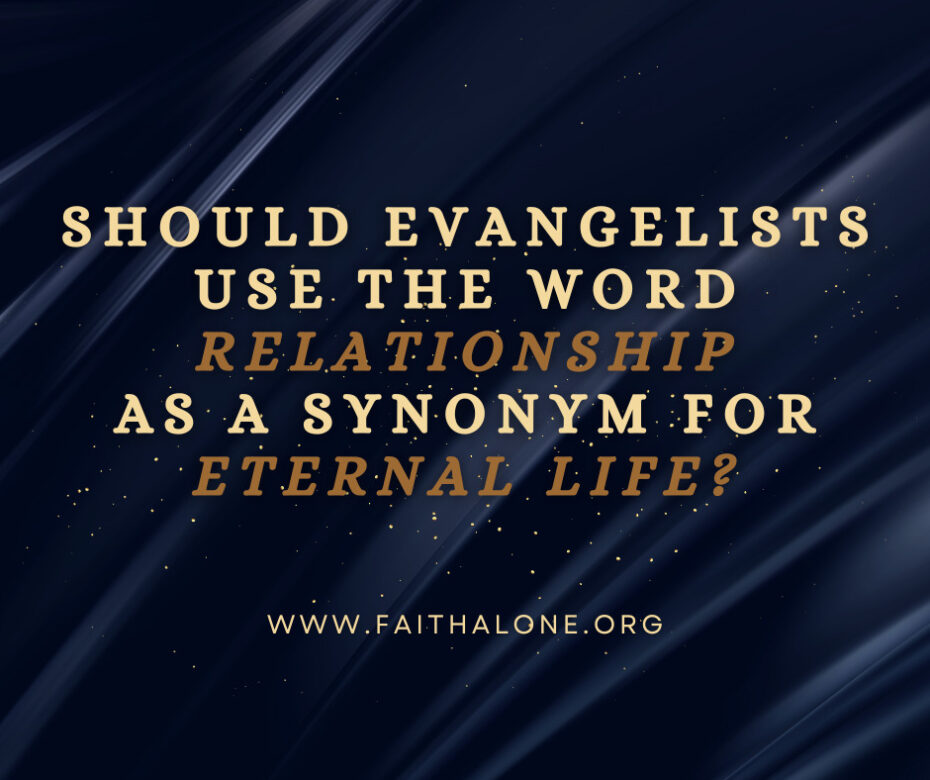In my last blog, I discussed how the word relationship has been replacing the word believe in some evangelistic settings. I argued that this term can cause confusion when applied in this way. In this blog, I would like to explore the benefits and pitfalls of another popular application of the church’s current use of relationship.
Sometimes relationship is presented as the result of believing in Jesus. For example, the evangelist might say that when the unbeliever comes to faith, he enters into a permanent relationship with God. By this, they may mean that the believer becomes a child of God–a member of God’s forever family. Certainly, being a child of God illustrates the permanent position we have before Him. We see this, for example, in John 1:12:
But as many as received Him, to them He gave the right to become children of God, to those who believe in His name (emphasis added).
The moment a person believes in Jesus for the free gift of eternal life, they become His child forever. When presented in this way, the concept certainly communicates the idea of everlasting life and the eternal security of the born-again person. This is the core message the evangelist should strive to communicate to the unbeliever and using the term in this way could be beneficial.
However, there’s an important distinction that must be made. When the word relationship is used in this way, what the evangelist means is actually closer to the idea of relation than relationship. To put it simply, there is a difference between being related to someone and having a relationship with that person. While both words evoke the concept of connection, they don’t refer to the same thing.
For example, at a family reunion a few years ago, my father sat next to a first cousin he had never met. He didn’t even know her name. But they were undeniably related; the woman was the mirror image–in female form–of my dad. They were permanently related by blood, but they didn’t have a relationship.
Free Grace Theology teaches that salvation and discipleship are two separate issues that should not be mixed. Someone can be saved but not follow the Lord in discipleship. In other words, a believer is always related to the Father as His child, but the believer is not necessarily always in an abiding relationship with his heavenly Father. Just as a child doesn’t always have a relationship with their earthly parent, believers can fall out of fellowship with the Lord. In this sense, believing in Jesus for eternal life does not guarantee a relationship.
In Rev 3:14-20 we see this in the believers at the church of Laodicea. The believers in this passage have become so self-sufficient that they no longer have an intimate relationship with their Savior (v 17). This is illustrated by the image of the Lord knocking on the door of the church, offering to come in to dine with them if they repent (v 20). In this passage, dining evokes a picture of the intimacy of sitting down to share a meal with another person. The Lord wants to have fellowship with His children; however, He won’t force His children to love Him. On his discussion of this passage, Zane Hodges writes:
The Laodiceans were wayward children of God. But the love of their Savior pursued them and “child trained” them the way that His faithfulness required. Solemnly, He called them to repent of their lukewarm spirit and to renew their intimacy with Him” (Zane C. Hodges, Absolutely Free, A Biblical Reply to Lordship Salvation. 114, emphasis added).
Here Hodges draws out the distinction between being a child and having an intimate relationship with the Lord. While the Laodiceans were the Lord’s children, they were excluding Him from having a close–a dining–relationship with them. The Lord wasn’t going to push His way into the meal. The believers at Laodicea had the freedom to choose whether or not they wanted to pursue their relationship with the Lord via repentance and obedience (v 19).
In light of this distinction, if the evangelist wishes to use the term relationship to illustrate the gift of eternal life, he needs to explain what he means. As discussed in the previous blog, the word relationship is not found in the Gospel of John. The fourth gospel is often referred to as the Gospel of life, not the Gospel of relationship. This is because the Lord never called unbelievers to believe in Him for a relationship. He told unbelievers that they needed eternal life (John 3:16, 4:10,14, 11:26). While it is not necessarily inappropriate to use the word relationship in this way in an evangelistic setting, I would still encourage all of us to use the language of the text when we share our faith. Jesus spoke of the gift of eternal life, and so should we.

